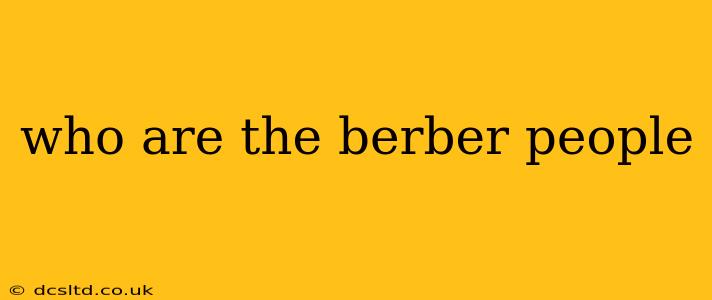The Berber people, also known as Amazigh (singular: Amazigh, plural: Imazighen), are an indigenous North African population group with a rich and complex history stretching back millennia. Their story is one of resilience, adaptation, and a powerful cultural identity that has persevered despite centuries of influence from other civilizations. Understanding the Berber people requires exploring their language, traditions, and ongoing struggle for recognition and self-determination.
What is the Origin of the Berber People?
The origins of the Berber people are shrouded in some mystery, but archaeological and linguistic evidence suggests a presence in North Africa dating back to the Neolithic period. Genetic studies point to a complex ancestry, reflecting millennia of interaction with various groups migrating through the region. While pinpointing a single origin is difficult, it's generally accepted that they are among the oldest inhabitants of North Africa, predating many other groups that have subsequently settled there.
What Languages Do Berber People Speak?
Berber languages are a branch of the Afro-Asiatic language family, distinct from Arabic and other languages in the region. They're not a single unified language, but rather a collection of related dialects and languages, often grouped into three main branches: Zenati, Tarifit, and Tashelhit. The precise number of Berber languages and dialects is debated, but the diversity reflects the vast geographical expanse across which the Berber people are scattered. Many Berbers are also bilingual or multilingual, speaking Arabic and French in addition to their native Berber language.
Where Do Berber People Live?
Berber populations are primarily concentrated across North Africa, spanning countries including Morocco, Algeria, Tunisia, Libya, Egypt, and even parts of Mauritania and Mali. Their distribution isn't uniform, however, and their density varies considerably from region to region. Historically, Berber communities have inhabited diverse environments, from mountainous regions to coastal areas and deserts.
What are some of the Berber People's Traditions and Customs?
Berber culture is incredibly diverse, with traditions varying significantly based on location and specific tribal affiliations. However, some common threads run throughout:
- Strong Tribal Identity: A deep sense of tribal affiliation and loyalty remains a defining characteristic of many Berber communities. Tribal structures often play a significant role in social organization and governance.
- Unique Art and Crafts: Berber art and craftsmanship are renowned for their beauty and unique styles, showcasing a rich heritage. This includes intricate textiles, jewelry, pottery, and traditional architecture.
- Oral Traditions: Storytelling, poetry, and music have played a crucial role in preserving Berber history, culture, and values across generations.
- Varied Religious Beliefs: Historically, Berber communities have embraced various religious beliefs, including indigenous Berber religions, Christianity, and Islam. Today, the majority are Muslim, but their faith often incorporates elements of pre-Islamic traditions.
How is Berber Culture Preserved Today?
Despite facing pressures of assimilation and globalization, Berber culture persists. Efforts to revive and preserve the language, art forms, and traditions are underway across North Africa. This includes:
- Cultural Centers and Museums: Dedicated institutions showcase and celebrate Berber culture and history.
- Language Revitalization Programs: Initiatives to teach Berber languages in schools and promote their use in daily life are gaining traction.
- Cultural Festivals and Events: Regular festivals and events provide platforms to celebrate Berber heritage and foster a sense of community.
What Challenges Do Berber People Face?
The Berber people have faced numerous challenges throughout history, including:
- Marginalization and Discrimination: Historically marginalized in many North African countries, they have often been denied full political and social participation.
- Language Suppression: The dominance of Arabic in many contexts has led to a decline in the use of Berber languages.
- Loss of Traditional Lands: Changes in land ownership and resource allocation have sometimes negatively impacted Berber communities.
Are Berber People Indigenous to North Africa?
Yes, the Berber people are widely considered to be indigenous to North Africa. Their continuous presence in the region for millennia, long before the arrival of other significant population groups, strongly supports this claim.
What is the Difference Between Berber and Arab?
While both groups inhabit North Africa, they are distinct. Berbers are indigenous to the region, possessing their own languages and distinct cultural traditions that predate the arrival of Arab populations. Arabs, on the other hand, migrated to North Africa over centuries, bringing with them the Arabic language and Islamic faith. Many North Africans today have a mixed Berber-Arab heritage, reflecting centuries of interaction between the two groups.
This exploration of the Berber people only scratches the surface of their rich and fascinating history and culture. Further research into specific Berber groups and regions will reveal an even deeper appreciation for this remarkable population's enduring legacy.
